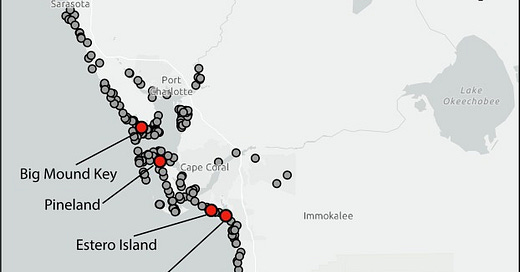Hello Friends,
This week I came across a new word, “Survivance.” Gerald Mizenor, an American writer and scholar, and member of the Minnesota Chippewa Tribe, created it. According to him, “Survivance” means, “a sense of native presence over absence, nihility and victimry.”
To be sure, I looked up “nihility,” and it means “nonexistence or nothingness.” This definition is important to consider the fate of the Calusas, the native American nation, or tribe, that I feature in my upcoming novel Shame of Kings. They dominated southwest Florida in the 16th and 17th centuries and probably much earlier.
They were unique in that they did not rely on organized agriculture for food. They mainly fished and hunted, with shellfish a key part of their diets.
They also changed the geography of Florida. The dug several canals, and built up mounds of shell over centuries, so much that they formed islands. Their main island, Mound Key, still exists in Estero Bay.
You may have heard of Ponce de Leon. The Spanish explorer/conquistador went ashore in the Calusa territory in July, 1521. Accounts state that the Calusas immediately attacked, hitting de Leon in the leg with an arrow. The Spaniards retreated and he died a few days later in Cuba.
In 1566, Pedro Menéndez de Avilés, another Conquistador, arrived on Mound Key. According to several sources, Carlos, the Calusa king, negotiated with Menendez and agreed to let the Spaniards build a fort, including a church, on Mound Key.
Although the fort remained there for years, the Calusas never really accepted the Spaniards, neither their religion, nor their position as a powerful nation.
From my research for Shame of Kings, I learned that the Calusas never gave in to Spanish authority, and only succumbed over 100 years later when the British took control of Florida. They armed Creek Indians and sent them to attack and enslave the native peoples in Florida.
By then, the Calusas were still an independent nation, yet European diseases had weakened them. The Creeks killed many Calusas and forced some into slavery. A few may have been absorbed into the newer Seminole tribe. A few more survivors escaped to Cuba where they seem to have disappeared into the past.
It is important to note that the Calusas never willingly gave in to European authority. They held on into the early 18th century. I learned that the Calusas maintained their independence and unique culture longer that most tribes in North America.
This brings me to “Survivance.” The Calusas maintained their independence, their identity, far longer most tribes in North America, yet they disappeared. If would fair to say the were exterminated. The terms “absence, nihility and victimry” apply to their story. There is some real irony here.
Many people in Florida only know that the Calusas were a tribe from sometime in the past, but that’s it. Nationwide, they are even more obscure than other tribes like the Apaches, Comanches, and Seminoles.
So what does it mean that the Calusas basically disappeared after maintaining their independence for so long?
Now, if you go to southwest Florida, you can find evidence of the tribe, but you have to make an effort. You can only get to Mound Key by boat. Unless you know what to look for, it looks like any other island in Estero Bay. Other Calusa sites, like Randall Research Center and Ortona are far from the big tourist areas.
While few know the history of the tribe, the word Calusa appears all over Florida. Throughout the state, there are dozens of businesses, roads, schools, and churches with “Calusa” in their name. The Caloosahatchee River runs from Lake Okeechobee west to Fort Myers.
Again, I keep thinking about how the Calusas no longer exist as a distinct tribe, even though their name is everywhere Florida. It’s a shame that people don’t know their story. I believe people should know about the Calusas. Hopefully people who read my book, Shame of Kings, will enjoy learning about them.
Do you know of any other groups that people should know? Other tribes that have disappeared? Please share some of these stories in the comments. Thanks for reading.



